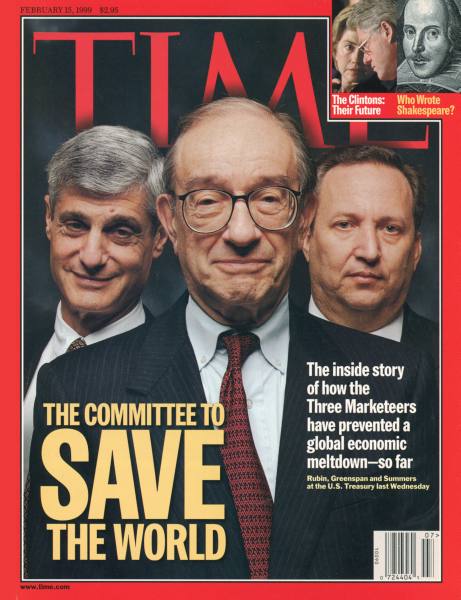The Long Financial Crisis (updated)
[youtube]http://www.youtube.com/watch?v=AA0mFjJbNH8[/youtube]
It’s commonplace to describe the financial crisis as a once-in-a-century event, but I question whether that is the case. Perhaps we’re not in the midst of a short-lived financial shock, but a long crisis that stretches back into the 1990s.
Here’s Paul Blustein on Alan Greenspan:
The Fed chief told the G-7 that in almost fifty years of watching the U.S. economy, he had never witnessed anything like the drying up of markets in the previous days and weeks.
Greenspan wasn’t speaking in Autumn 2008 when Lehman’s collapsed, however, but ten years’ earlier in the wake of the spectacular blow-up of Long-Term Capital Management, which lost $4.5 billion almost overnight in what the fund’s principals post-rationalised as a 100-year flood.
Long-Term (with its superbly hubristic name) was brought low by derivatives, just as Lehman’s would be a decade later.
(Robert Rubin, Clinton’s Treasury Secretary, was one of those left picking up the pieces – part of ‘the committee to save the world’, with Greenspan and Larry Summers. Rubin went on to preside over Citigroup as it needed a succession of massively expensive bailouts, when its derivatives tanked in the subprime crisis.)
The proximate cause of Long-Term’s failure was Russia’s Rouble crisis, when the country defaulted on its debt after the IMF refused to mount a second bailout.
The Russian crisis itself came in the midst of a long series of dramatic economic failures that hits the world between 1997 and 1999, mostly in East Asia (Thailand, South Korea, Indonesia etc), but which also battered Brazil and would devastate Argentina in 2002. Blustein again:
Time and again, panics in financial markets proved impervious to the ministrations of the people responsible for global economic policymaking.
IMF bailouts fell flat in one crisis-stricken country after another, with the announcements of enormous international loan packages followed by crashes in currencies and sever economic setbacks that the rescues were supposed to avert.

